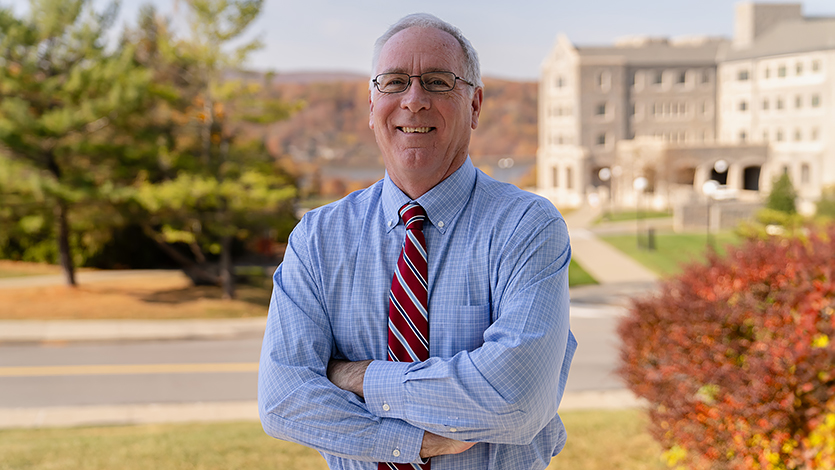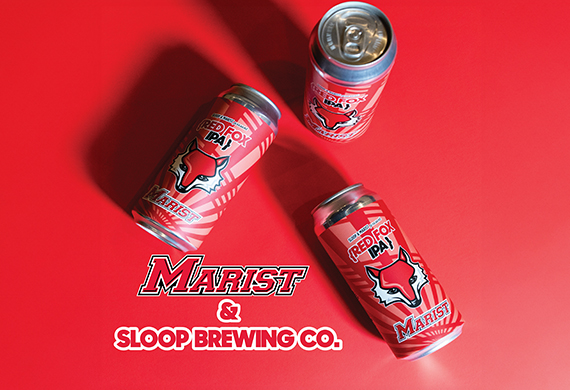Office Hours With Dr. Martin Shaffer, Dean of the School of Liberal Arts

Office Hours is a recurring segment where the Inside Marist team sparks conversations with key members of the campus community. Find out more about the inner workings of the College, gain fresh perspectives, and celebrate the invaluable contributions of those who make Marist the vibrant community that it is.
In this segment, Inside Marist’s Michelle Eggink interviews Dr. Martin Shaffer, Dean of the School of Liberal Arts. Dr. Shaffer holds a Ph.D. and M.A. in political science from SUNY Albany and a B.A. from Le Moyne College. Since joining Marist in 1994, he has chaired the Political Science Department and became dean in 2008. He teaches American politics, has published in journals like Presidential Studies Quarterly and Policy Studies Review, and is a frequent media commentator on presidential and congressional elections. A strong advocate for experiential learning, he helped establish Marist’s Center for Civic Engagement & Leadership and the Albany Summer Internship Program.
Q How would you describe your leadership style?
A: My favorite word after “dad” is “coach,” so I approach academic leadership much like coaching—by encouraging people, recognizing their strengths, and helping them grow. I try to lead by example, working alongside faculty in teaching and advising, rather than taking a top-down or ivory-tower approach. I also focus on being pragmatic, balancing a clear vision with the day-to-day steps needed to achieve it.
Dean Shaffer sporting his Yankee hat and ski poles in his office. Photo by Nelson Echeverria/Marist College.
Q What do you do for fun outside of academia?
A: I'm a big sports fan—huge Yankees, Giants, and Knicks —and I’ve been skiing since I was a kid, which all my kids do as well. I also spent 20 years coaching soccer, along with baseball and Catholic Youth Organization (CYO) basketball, so sports are a big part of my life.
Recently, my wife and I have been enjoying hiking around the Hudson Valley, exploring spots like the Vanderbilt Mansion and Storm King. After a hike, we like to check out the local breweries and great restaurants in the area. I love living in the Hudson Valley because it offers the best of all seasons, and while I enjoy visiting places like Florida, I’d much rather live here. We’ve also enjoyed traveling to places like Quebec, Iceland, London, and Florence.
Q What’s your favorite food?
A: I’d say lobster or seafood pasta. Growing up, my family often vacationed near the ocean, so seafood became a favorite for me.
Q What’s your favorite vacation memory?
A: Road trips with my family. We drove from New York across the country, visiting places like Mount Rushmore, Yellowstone, and the Grand Canyon. It was quite the adventure, especially with my parents and three kids in a station wagon and a trailer!
Q If you could have dinner with someone dead or alive who would it be?
A: I’d get dinner with Abraham Lincoln because his story is remarkable, rising from poverty to the presidency. He also managed the issue of slavery with a blend of vision and pragmatism, moving the country forward. Plus, he was known for his great storytelling, so I'd love to hear some of his stories and famous jokes!
Q What initially drew you to political science and how did you transition into academia?
A: I’ve always been fascinated by history and politics. At first, I was torn between becoming a football coach and social studies teacher or pursuing a career in law. I went to law school for a bit but quickly realized it wasn’t for me—something my students find amusing, given how many law school recommendations I’ve written since then. As a first-generation college student, I was grateful to have an incredible mentor during my undergraduate years who inspired me to consider academia. After working in nonprofits focused on hunger and poverty, and later for a state senator, I decided to complete my PhD in political science. Eventually, I found a home at Marist, where I’ve spent over 30 years combining my passion for education and public service.
Q I hear you’re a political savant. Since it’s an election year, tell me about what you’re teaching in your political science class?
A: I’m teaching a course on the history of the American presidency, which I’ve been doing almost every year since I started at Marist. It’s a comprehensive class that counts for political science, history, and even American studies credit. We certainly discuss the election, but the focus is on presidential leadership through the lens of history and politics. We cover everything from the Constitution to modern presidents, and topics like elections, foreign policy, and how presidents interact with Congress and the media.
By mid-semester, the class transitions into more contemporary issues, examining presidencies from Kennedy to Biden. We cover a lot of topics in class, but I love it since I’ve always been interested in presidential history. By the time I was in early elementary school I could name all of the American presidents in order. My mother took me to the public library a lot as a kid and presidential history was what I always gravitated toward.
Dean Shaffer with his impressive collection of presidential biographies. Photo by Nelson Echeverria/Marist College.
Q Can you talk about the range of majors and minors offered by the School of Liberal Arts and how they help expand opportunities for students?
A: In the School of Liberal Arts and Marist as a whole, we emphasize the power of "and" rather than "or," encouraging students to go beyond their major by adding second or even third fields of study. This academic flexibility allows students to create unique combinations that enhance their skills and future opportunities. For example, a history major might pair their degree with a minor in public relations or business, while a communication major might add minors in political science and theater. A vast majority of our students in the School of Liberal Arts study at least two fields—whether through a major and minor, double majors, or certificates. Programs like the paralegal certificate, which is American Bar Association (ABA) approved, are especially popular, offering students immediate career opportunities or a strong foundation for law school.
The programs in our school are linked together through three focus areas – social justice and public service, arts and creativity, and diversity and global awareness. Many of our students go into teaching, nonprofits, or government work. While we have strong arts and creativity programs like theater and creative writing, and our growing global studies and language programs emphasize diversity and globalization, the three focus areas exist in all our programs. Our interdisciplinary approach connects programs across schools, preparing students to thrive in diverse and evolving fields.
Q What advice do you have for School of Liberal Arts students prospective and current?
A: My biggest advice is to find some people who support you and believe in you and make them your mentors!
I would also say to trust yourself and pursue your interests. I dropped out of law school and pivoted to a career in academia, and I really can’t think of a better way to spend my life than as a professor and Dean at Marist. When I dropped out, I soon took a job at a nonprofit organization in Troy, New York and that is where I met my wife, Joanne, and we have been married now for over 36 years! I think when you make good choices with the big decisions in your life, the rest of the day-to-day decisions get a lot easier! So, who knows, when you trust yourself, you might be on your way to a rewarding career and meet your life partner too!
Dean Shaffer in Fontaine Hall. Photo by Nelson Echeverria/Marist College.
Q Why is mentorship important for college students?
A: Whether it’s a professor, staff member, or someone you meet through an internship, mentorship is key to navigating college and beyond. Teaching, for me, is the vehicle to really get to know students and help them succeed. I still work with my advisees closely, guiding them through challenges like internships or graduation stress, and helping them rethink their paths when needed. As Dean, in addition to mentoring students, part of my job is to empower and help faculty develop in their own careers and help them provide opportunities for our students. Mentoring is the most rewarding part of the job—whether you’re a faculty member or a dean, it’s about helping people, especially our students, achieve their goals.
Mentorship was also critical for me as a student, and I try to pay that forward by connecting students with experiential learning opportunities. As a college student I spent a semester in D.C., interned with the New York State Attorney General’s office in Albany, and participated in service work in Appalachia. Those experiences shaped my career, and I’ve tried to replicate those opportunities for students here through programs like the D.C. Public Service trip, the Albany Summer Internship Program, the Center for Civic Engagement & Leadership, and even the Marist Poll. Students who engage with these opportunities are building important life skills and finding the support they need to succeed.
Q How does the School of Liberal Arts balance the traditional aspects of a liberal arts education with the need to prepare students for an ever-changing job market?
A: We do this by focusing on three key areas. First, we emphasize faculty and staff mentoring, which helps students navigate their academic and career paths. Second, we encourage students to study more than one field—going beyond their major to pursue their interests and to gain a broader skill set. Third, we prioritize experiential learning through internships, study abroad, undergraduate research, community engagement, and campus involvement. Most students carve their own path by choosing from these opportunities. Unlike other colleges where students are confined to one school, we don’t put up walls between our six schools, encouraging students to work across disciplines and fields. This approach prepares our students for success in a rapidly changing job market.
Q Can you share a memorable experience from your life?
A: I was lucky enough to attend the 1980 Winter Olympics in Lake Placid, where I saw the slalom race at Whiteface Mountain, featuring Swedish skier Ingemar Stenmark, who won the gold, and the U.S. skier Phil Mahre, who won the silver. The most unforgettable moment was being in Lake Placid the night the U.S. hockey team beat the Soviet Union in the "Miracle on Ice" game. Every store had TVs showing the game, and when the U.S. won, the entire town erupted in celebration. It wasn’t the gold medal game, it was the semifinals, but it felt like one of the greatest Olympic victories ever. Even though I wasn’t in the arena, being in Lake Placid that night was an incredible experience I'll never forget!



